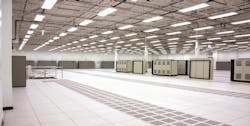Iron Mountain Acquires FORTRUST, Expanding its Data Center Footprint
In a sign of its growing ambitions in the data center business, information storage specialist Iron Mountain has agreed to purchase Denver-based FORTRUST for $128 million, the companies announced today. The deal marks the continuation of the consolidation in the data center industry.
The deal expands Iron Mountain’s geographic footprint, adding 9 megawatts (MW) of existing data center capacity and expansion space for an additional 7 MW within FORTRUST’s 210,000 square foot facility in Denver. FORTRUST’s historic focus on high reliability and security aligns with Iron Mountain’s heritage in information storage and retention.
“With this acquisition – our first in the data center business – we are expanding our network to better serve target customers for whom our reputation for enhanced security, customer service and compliance are important factors in data center selection,” said Mark Kidd, senior vice president and general manager, Iron Mountain Data Centers. “This acquisition, together with Phase I of our Northern Virginia campus, will bring total capacity to more than 30 MW with the ability to expand to more than 70 MW across our data center properties.”
Iron Mountain has operated data center space for 20 years in its massive underground facility near Pittsburgh. In recent years it has expanded its footprint, building a new data center in the Boston market as well as its new campus in Manassas, Virginia. Between these projects, Iron Mountain expects to deliver 500,000 square feet of new data center camapcity in 2017.
FORTRUST: A Reputation for Uptime
FORTRUST has operated in the Denver market for 15 years and enjoys a strong regional presence while also serving as a critical location for customers seeking East-West data center redundancy. The company owns one of the nation’s first Tier III Gold colocation data centers, which has about 38,000 rentable square feet of colocation space that will support another 7 MW of high-density capacity. FORTRUST says its Denver data center has not experienced any downtime in its 15 years of operations.
“We are excited by the potential this transaction with Iron Mountain represents, giving our customers access to a larger portfolio of locations and services while still receiving the highest level of customer service and operational quality FORTRUST has delivered for over 15 years,” said Steven Knudson, CEO of FORTRUST.
FORTRUST operates conventional raised-floor colocation space, but also uses data center modules, working with both BASELAYER and CenterCore. FORTRUST has deployed customer IT equipment in modules in IO data centers in Phoenix and New Jersey.
Under terms of the deal, Iron Mountain is acquiring FORTRUST’s parent company, MAG DATACENTERS LLC. Iron Mountain hopes to complete the acquisition by the end of the third quarter, and intends to fund the purchase with a combination of $73.5 million from a private placement of stock to the seller and $54.5 million in cash. Iron Mountain said it expects a stabilized return in the mid teens following build-out and lease-up of the expansion capacity.
Iron Mountain: We See Opportunity
“Our expanded geographic platform and deep customer relationships within both our data center and data management businesses will accelerate our momentum in this attractive business,” said William Meaney, Iron Mountain’s president and CEO William L. Meaney.
“We continue to see opportunities to expand our business through strong organic growth, new development and acquisition,” said Meaney. “Together with our existing data centers and completion of the first phase of our Northern Virginia data center campus next month, this acquisition will strengthen the foundation of a long-term growth engine and help accelerate the growth in our adjacent businesses.”
Iron Mountain has 230,000 customers around the world, with a real estate network of more than 85 million square feet across more than 1,400 facilities in 52 countries.Founded in 1951, Iron Mountain stores and protects billions of information assets, including critical business documents, electronic information, medical data and cultural and historical artifacts.
About the Author



